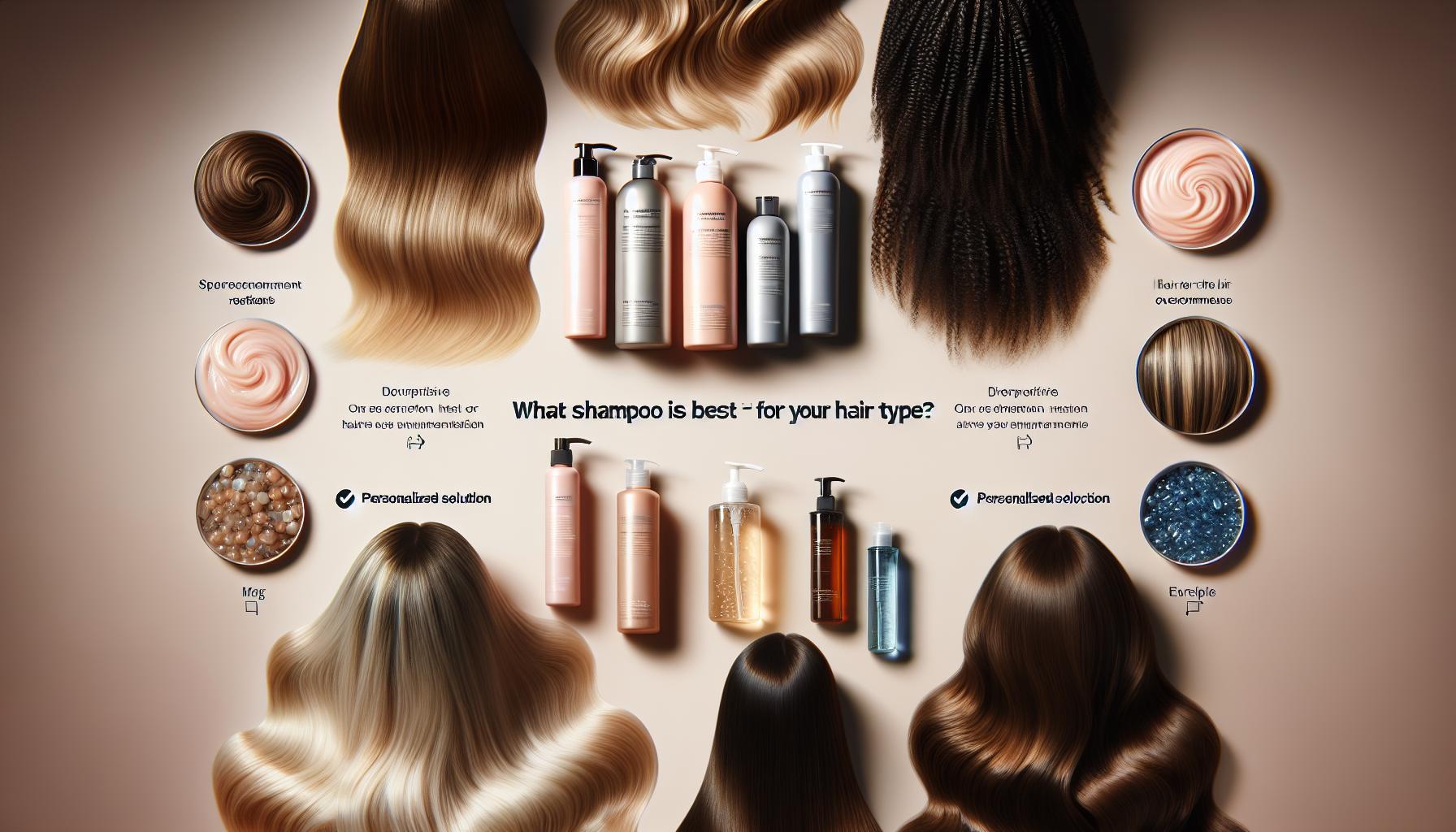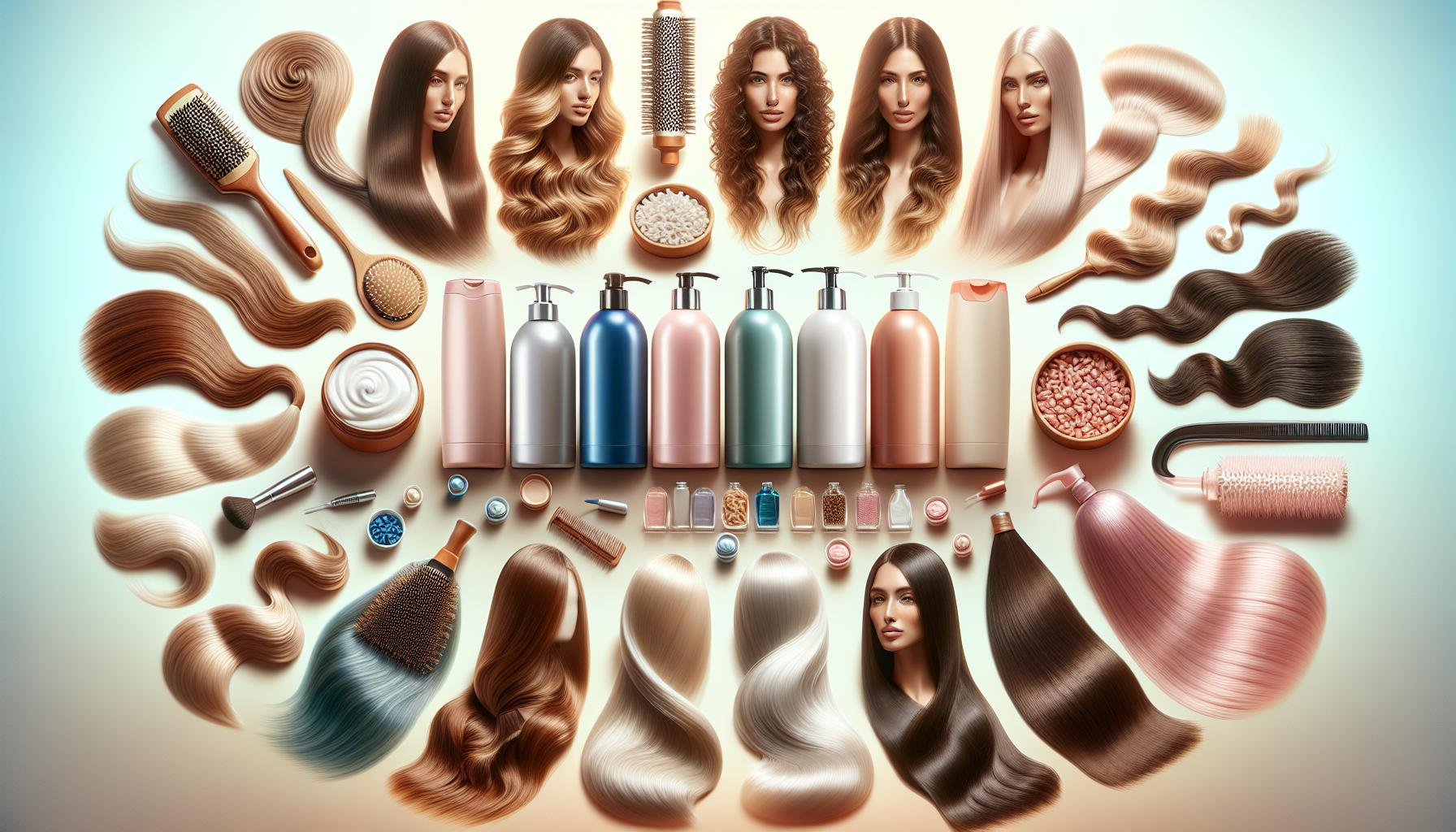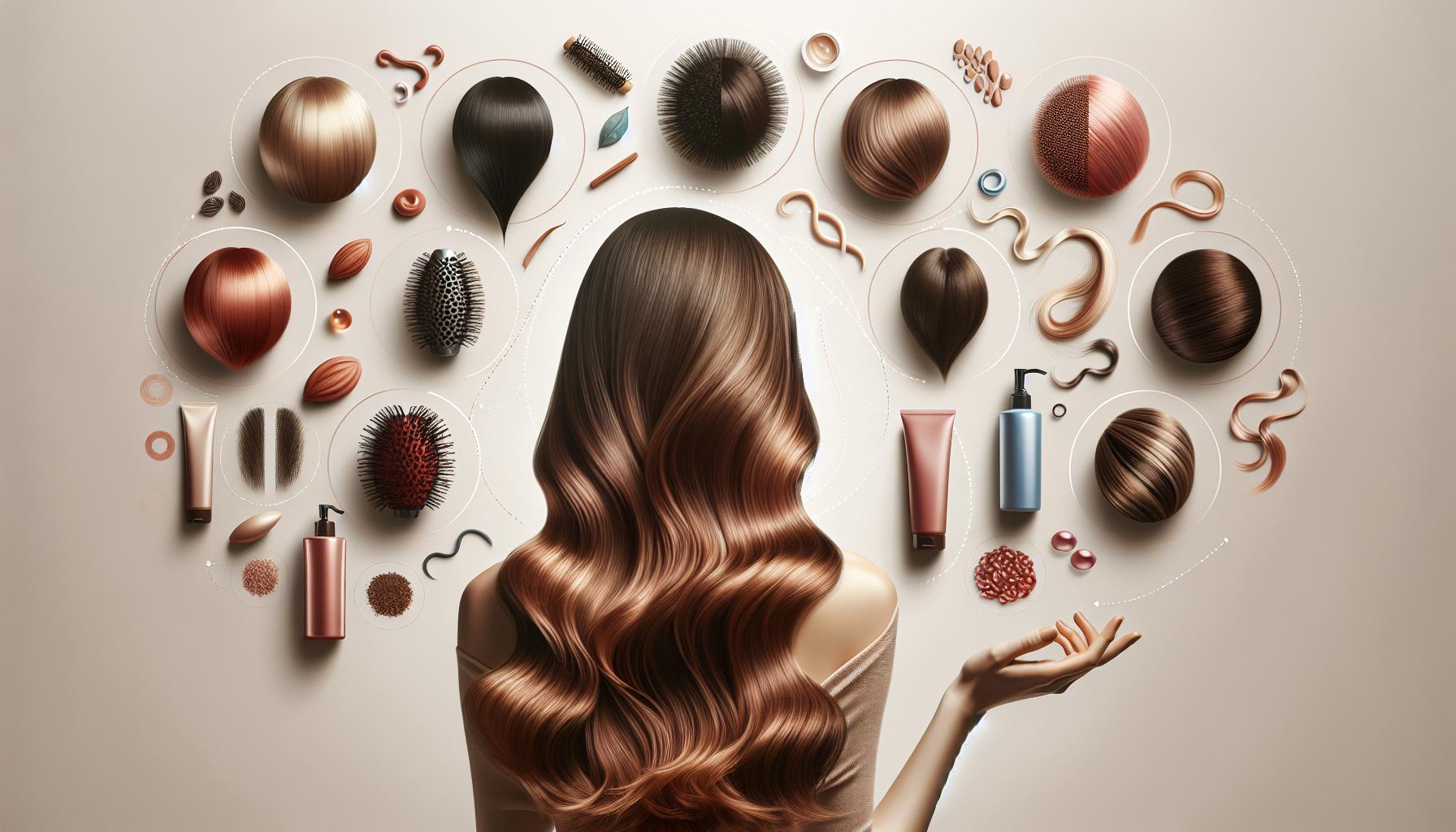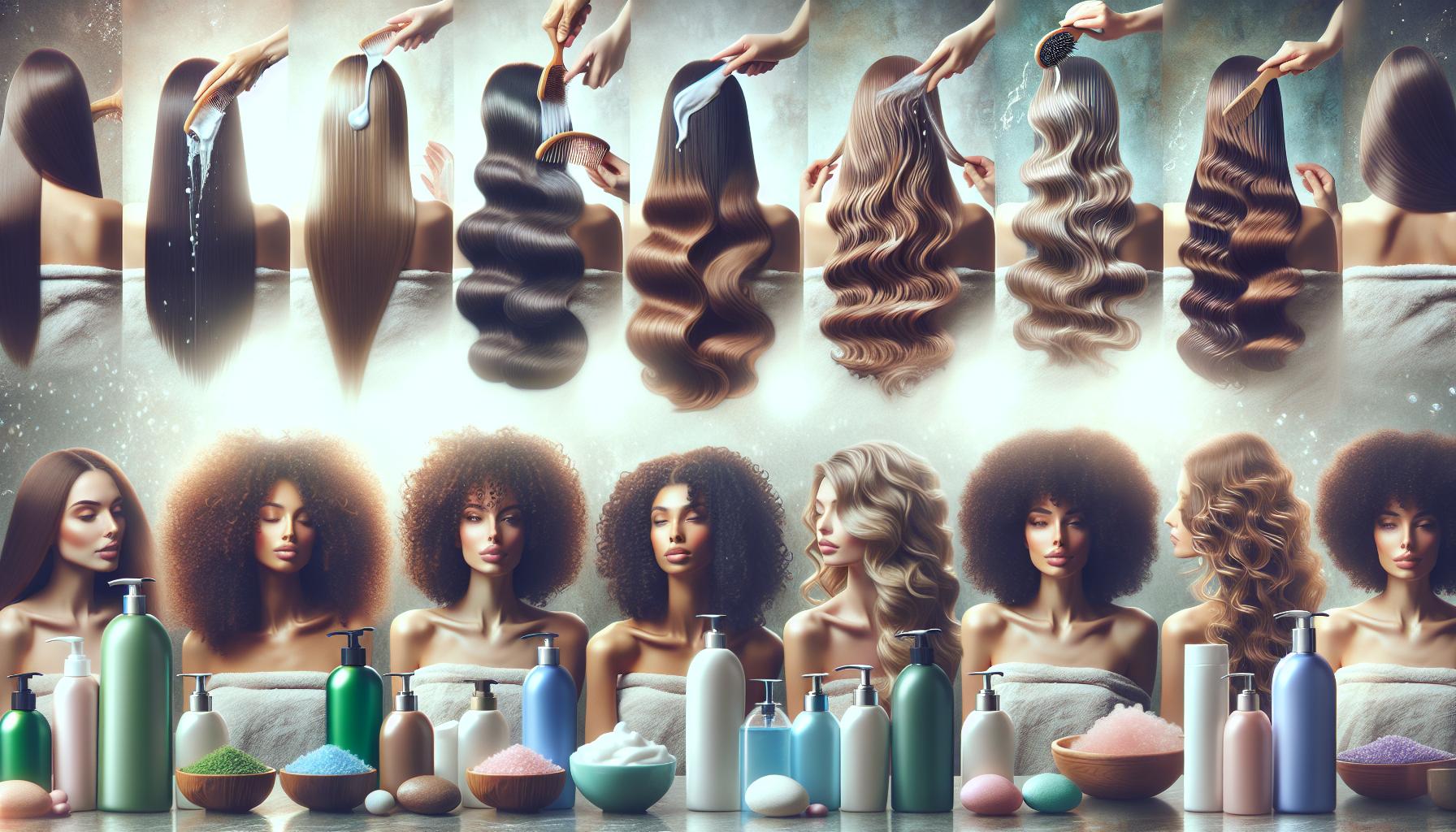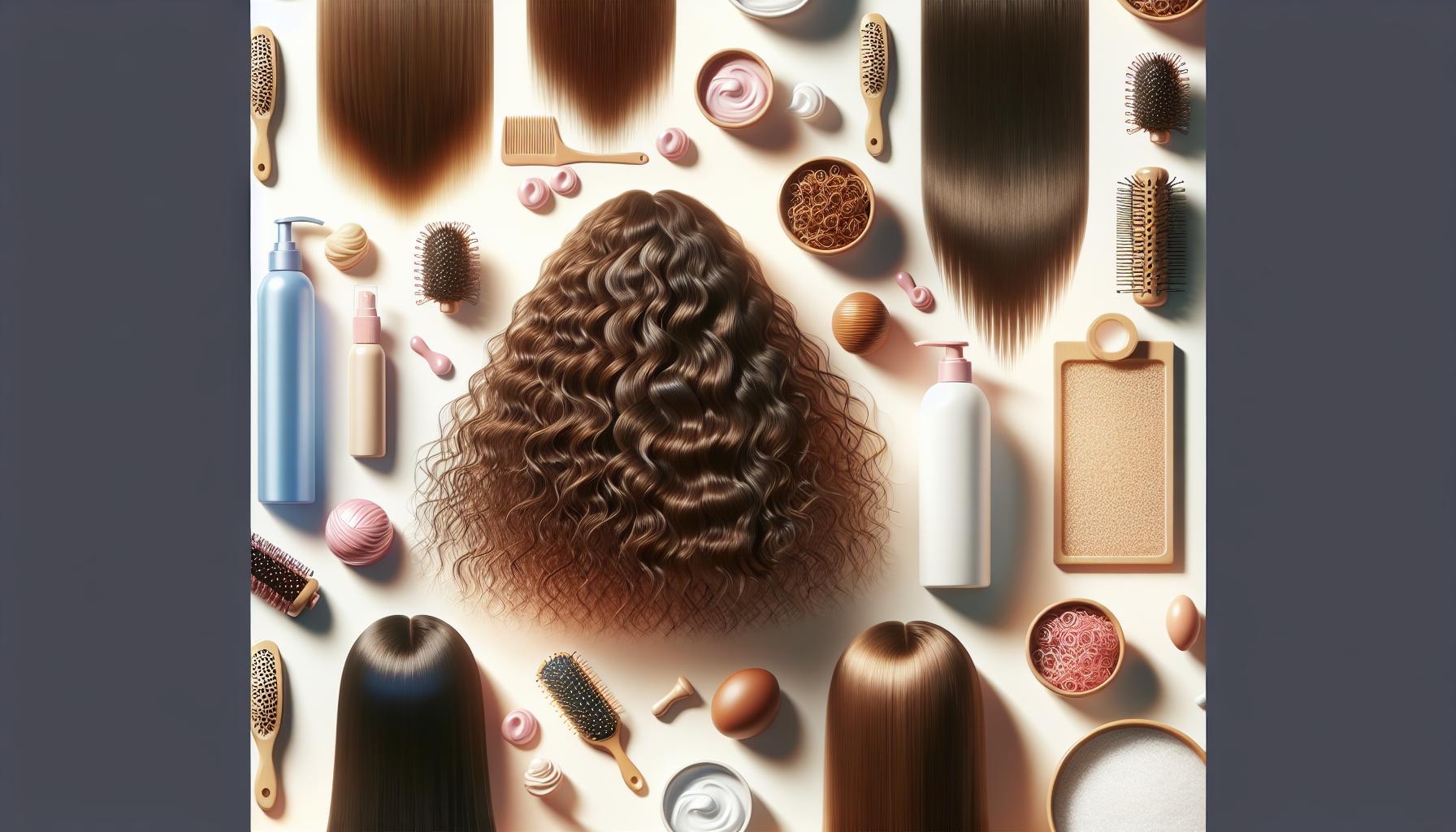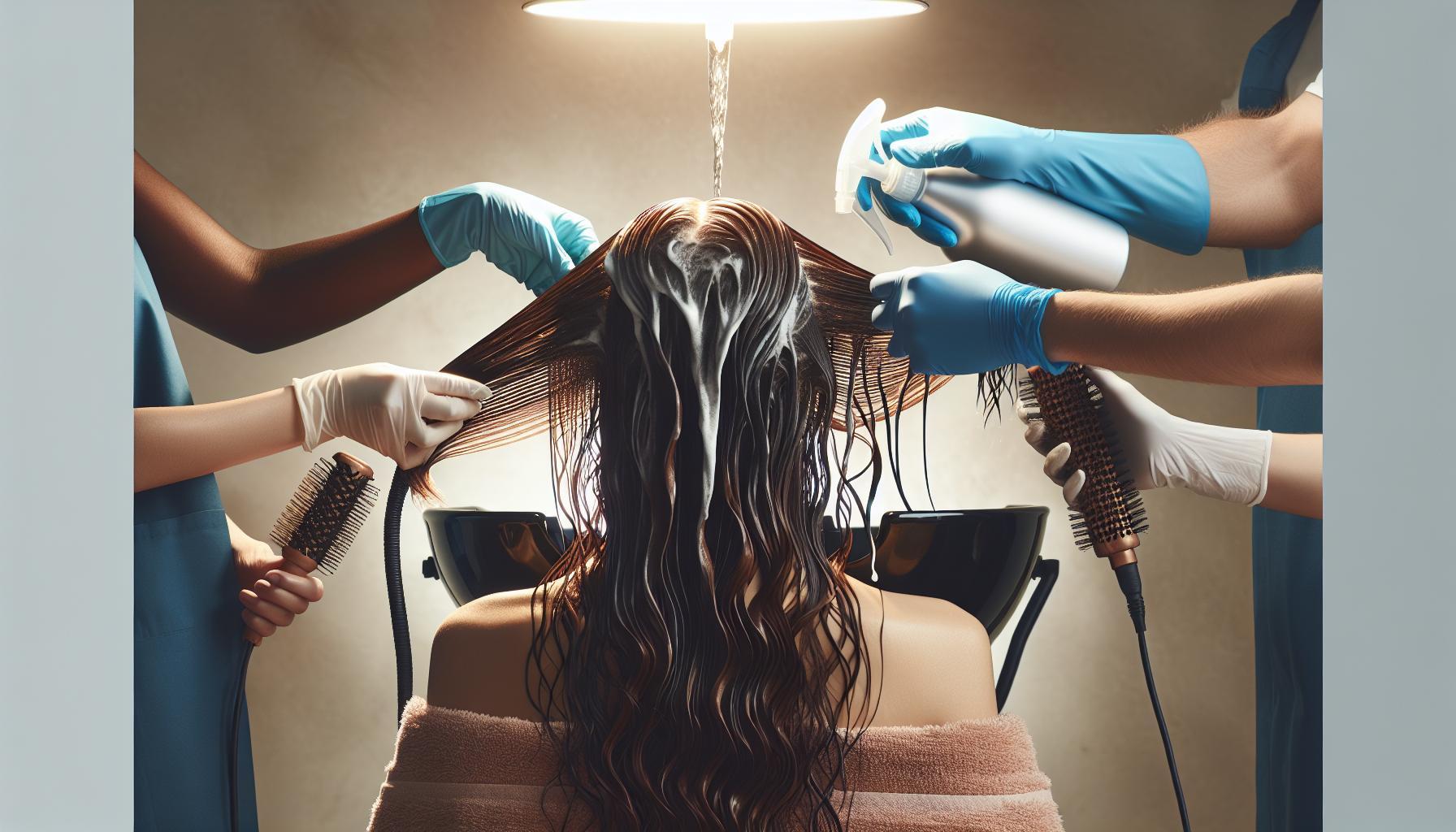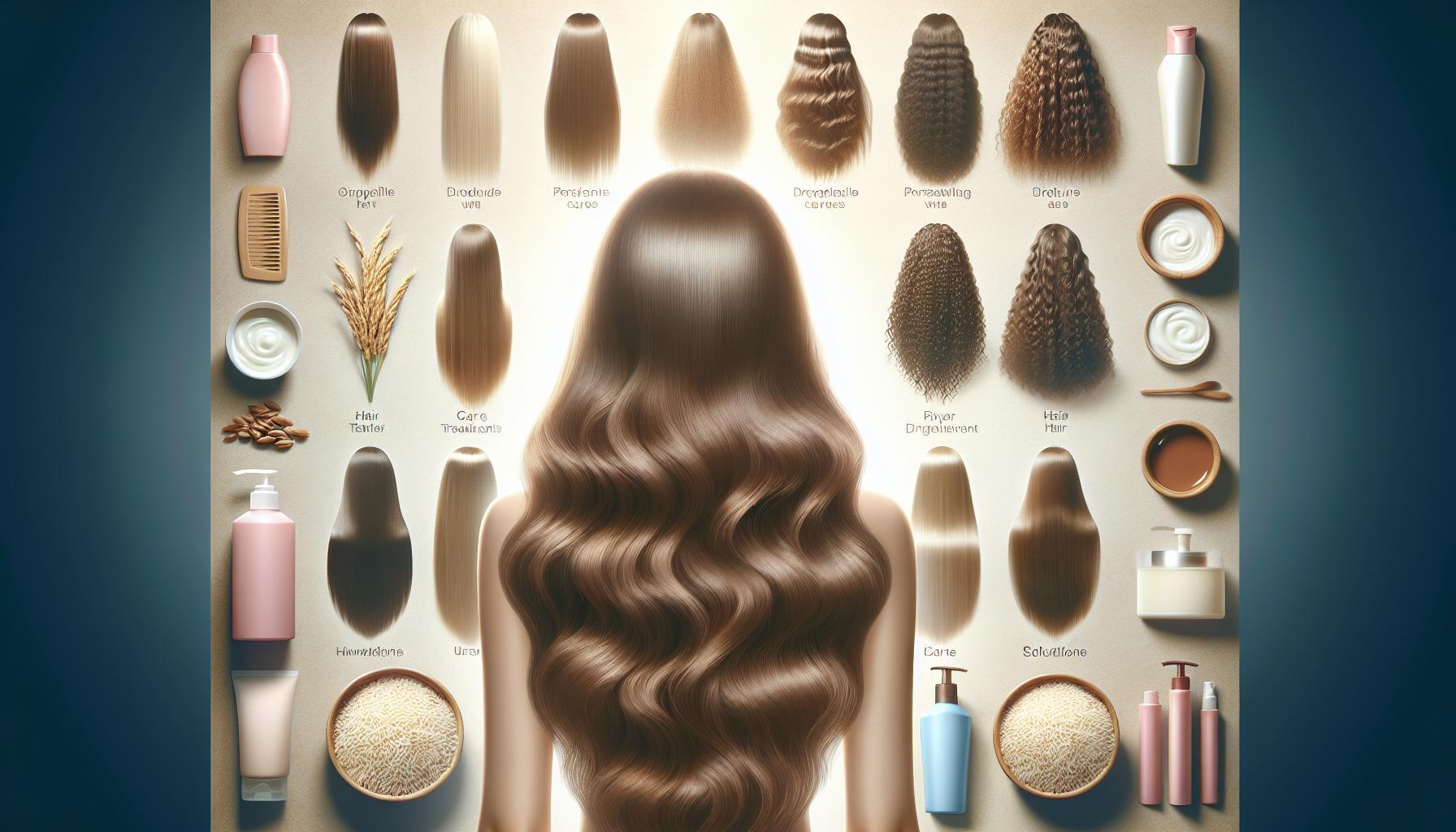Choosing the right shampoo can be overwhelming, with countless options that promise too address every hair concern. Understanding your unique hair type and needs is crucial for achieving vibrant, healthy locks. This personalized selection guide will help you navigate the sea of products, ensuring you find the perfect match for your hair’s specific requirements.
Contents
- Understanding Your Hair Type: A Key to Effective Shampoo Selection
- Ingredients Matter: What to Look for Based on Your hair Needs
- Straight, Curly, Wavy, or Coily: Tailoring Your shampoo to Hair Textures
- The Impact of Scalp Health on Shampoo Choices: Nourishment for Follicles
- Common Hair Concerns: Choosing Shampoo for Damage, Dullness, and Hair Loss
- Transitioning Your Hair Care Routine: When and How to Change your Shampoo
- Exploring Natural vs. Synthetic: Finding the Right Balance for Your Hair
- Expert Tips for testing Shampoos: How to Find Your Perfect Match
- Q&A
- What shampoo is best for curly hair?
- How do I choose a shampoo for oily hair?
- Why does my scalp itch after using shampoo?
- Can I use the same shampoo for colored hair?
- What ingredients should I avoid in shampoo?
- How often should I wash my hair with shampoo?
- What is the best shampoo for fine hair?
- Why do I need a personalized shampoo selection guide?
- Wrapping Up
Understanding Your Hair Type: A Key to Effective Shampoo Selection
Choosing the right shampoo is like selecting the perfect outfit; it needs to fit your unique style and needs. Hair comes in various types, each requiring specific care for optimal health and appearance. Understanding these differences is crucial in developing an effective hair care routine that addresses the individual characteristics of your hair. When you can identify your hair type accurately, you can avoid the pitfalls of using generic products that may not serve your hair’s best interests.
Identifying Your Hair Type
It’s essential to recognize the main hair types to make informed selections. Here’s a quick guide:
- Fine Hair: This type tends to lack volume and can become easily weighed down. Look for volumizing shampoos that lift hair at the roots without adding heaviness.
- Thick or Coarse Hair: If your hair is this type, it often needs hydration and smoothing. Choose hydrating shampoos that provide moisture and manageability.
- Curly Hair: Curly locks require specialized moisture and frizz control. Opt for curl-enhancing shampoos that define curls while adding hydration.
- Oily Hair: This type can benefit from clarifying shampoos that remove excess oil without stripping natural moisture.
- Dry or Damaged Hair: Seek out repairing shampoos that focus on restoring moisture and strength.
Practical Steps to Determine Your Hair Type
To effectively discover your hair type, consider performing a simple test. Start by analyzing your hair after washing it. Observe its behavior when it’s dry and product-free. You can also assess your scalp’s condition and oil production. Here’s a concise method:
| Test | Type of Hair |
|---|---|
| Hair strands are thin and fall flat | Fine Hair |
| Strands feel thick and heavy | Thick Hair |
| Curls spring back when wet | Curly Hair |
| Oiliness within a day of washing | Oily Hair |
| Frizz and breakage evident | Dry or Damaged Hair |
By equipping yourself with this knowledge, you empower your hair care decisions, ensuring that your choice of shampoo directly correlates with the specific needs of your hair type. This is the cornerstone of understanding what shampoo is best for your hair type, forming the foundation for an effective personalized selection guide that will help you achieve your hair goals.
Ingredients Matter: What to Look for Based on Your hair Needs
Understanding the significance of hair care ingredients is essential for anyone seeking to optimize their hair health. The right components can enhance your hair’s natural beauty while addressing specific concerns, making it crucial to become familiar with what to look for based on your individual hair needs. With a myriad of products available, knowing how to read labels can help you avoid ingredients that may not suit your hair type and benefit from those that do.
When selecting a shampoo, consider your hair’s unique characteristics. For those with dry or damaged hair, look for hydrating ingredients such as glycerin, aloe vera, and coconut oil. These substances help retain moisture and can restore shine and elasticity. Conversely, if your hair tends to be oily or prone to product buildup, opt for shampoos that feature salicylic acid, which can help clarify the scalp, or tea tree oil, known for its cleansing properties.
Key Ingredients to Consider
- Proteins: Essential for strengthening hair, proteins like hydrolyzed keratin and silk protein are beneficial for damaged hair.
- Sulfate-Free Surfactants: If you have a sensitive scalp or color-treated hair, look for sulfate-free options that use alternative surfactants like cocamidopropyl betaine.
- Natural Extracts: Ingredients such as chamomile or green tea provide soothing benefits and can promote scalp health.
For individuals battling frizz or curly hair, shampoos with silicones can be especially effective. These ingredients coat the hair shaft, providing a smooth finish and reducing moisture loss. Though, if you prefer a more natural regimen, look for alternatives like sheaf butter or jojoba oil, which nourish and hydrate without the potential buildup associated with silicones.
Identifying Hair Issues
Determining the right shampoo also involves understanding your specific hair issues.Here’s a simple guide to help pinpoint what to seek:
| Hair Concern | Suggested Ingredients |
|---|---|
| Dry Hair | Argan Oil, Shea Butter, Glycerin |
| Oily Hair | Salicylic Acid, Peppermint Oil |
| Color-Treated Hair | Protein Complexes, Nourishing Oils |
| Curly Hair | Silicones, Coconut Oil, Aloe Vera |
By arming yourself with knowledge of these ingredients, you can make informed choices that cater specifically to your hair’s needs. The journey to healthy hair not only involves using the right products but also understanding how those products work within the context of your daily regimen.
Straight, Curly, Wavy, or Coily: Tailoring Your shampoo to Hair Textures
When it comes to selecting the right shampoo, understanding your hair texture is crucial. Diffrent hair types have unique needs that can considerably impact overall health and appearance.Whether you have straight, curly, wavy, or coily hair, finding the perfect shampoo tailored to your hair’s specific characteristics can elevate your hair care routine and enhance your style.
Straight hair
Straight hair tends to be more prone to oiliness and often lacks volume. Therefore, it’s essential to choose shampoos that provide balance without weighing your hair down. Look for clarifying shampoos or those designed for everyday use, as they won’t strip your hair of its natural oils while keeping it looking fresh. Products containing lightweight ingredients like aloe vera and essential oils can add moisture and shine without the heaviness.
Curly Hair
curly hair frequently enough requires more moisture due to its structure,which can make it drier. Curly-haired individuals should consider shampoos that are specifically formulated for their texture.These often include moisturizing ingredients such as shea butter or coconut oil. Avoid shampoos with sulfates, as they can lead to breakage and frizz. Instead, opt for hydrating shampoos or co-wash options that cleanse without stripping away essential moisture. Brands like Redken offer specialized products geared toward curls that can significantly improve definition and softness[[3]].
Wavy Hair
Wavy hair strikes a balance between straight and curly, making it versatile yet sometimes tricky to manage. Shampoos that enhance wave definition while controlling frizz are ideal. Look for products labeled as texturizing shampoos, which can help boost volume without drying out the hair. Ingredients like sea salt can add texture, while light oils can help maintain moisture. Regular conditioning treatments can also help in maintaining the wave pattern without excessive frizz.
Coily Hair
coily hair is often the driest because the shape of the curls prevents sebum from traveling down the hair shaft. It’s crucial to use shampoos rich in moisture and nutrients. Consider moisturizing or restorative shampoos packed with oils like jojoba or argan oil.Look for formulas free of sulfates and parabens to maintain a healthy scalp and hair texture.Products that are designed to provide deep conditioning are equally beneficial, making sure that curls remain bouncy and well-hydrated.
| Hair Type | Recommended Shampoo Type | Key ingredients |
|---|---|---|
| Straight | Clarifying/Everyday | Aloe Vera, Essential Oils |
| Curly | Moisturizing | Shea Butter, Coconut Oil |
| Wavy | Texturizing | Sea salt, Light Oils |
| Coily | Restorative/Moisturizing | Jojoba Oil, Argan Oil |
Incorporating the right shampoo into your hair care routine will not only improve the manageability of your hair but will also promote overall health. Choosing the appropriate shampoo based on your texture can transform your hair from drab to fab, ensuring that it looks its absolute best every day.
The Impact of Scalp Health on Shampoo Choices: Nourishment for Follicles
Understanding the crucial relationship between scalp health and the effectiveness of your shampoo can transform your hair care routine. A healthy scalp is not just a foundation for beautiful hair; it significantly influences how well your chosen shampoo performs in nourishing hair follicles. The right formula can enhance scalp vitality,leading to stronger,shinier hair,while an ill-suited product may exacerbate issues like dryness,dandruff,or irritation.
Why Scalp Health Matters
The scalp is home to numerous hair follicles, each requiring a balanced habitat to thrive.When the scalp is compromised—due to excess oil, dryness, or fungal imbalances—the hair that grows from these follicles can suffer, becoming fragile and lackluster. Ingredients that hydrate and exfoliate, such as salicylic acid or tea tree oil, are particularly beneficial for maintaining scalp health. These components help remove buildup, cleanse pores, and invigorate the scalp, thereby promoting optimal conditions for hair growth. For example, a product like a clarifying shampoo can effectively deep-cleanse the scalp, making it an essential choice if you’ve been using heavy styling products.
Choosing the Right Shampoo
It’s vital to tailor your shampoo selection to your scalp condition. Here are some considerations to guide your choice:
- Dry Scalp: Look for shampoos with hydrating ingredients like glycerin or oils (e.g.,argan or jojoba oils) that nourish both the scalp and hair.
- Oily Scalp: Opt for clarifying or volumizing formulations that contain ingredients like witch hazel or tea tree oil to control sebum production without stripping moisture entirely.
- Dandruff or Irritation: Medicated shampoos with antifungal actives such as ketoconazole or zinc pyrithione can definitely help combat dandruff while soothing scalp irritation.
Choosing the best shampoo for your hair type involves understanding not just your hair’s needs, but also the health of your scalp. This approach not only helps you select an effective product but also ensures that your hair remains nourished and vibrant over time. By focusing on both aspects, you can create a more personalized hair care regimen that addresses the root of many hair issues.Adapting your choices to match your scalp’s condition is an integral part of understanding “What Shampoo is Best for Your Hair Type? Personalized Selection Guide,” leading to improved hair quality and overall scalp health.
Common Hair Concerns: Choosing Shampoo for Damage, Dullness, and Hair Loss
Choosing the right shampoo can be a game-changer for your hair, especially when you’re dealing with issues like damage, dullness, or hair loss. Many people overlook the importance of shampoo tailored to specific hair concerns, often opting for generic products that may not deliver the desired results.Understanding your hair’s needs not only enhances the health and appearance of your locks but also empowers you to make informed choices.
Addressing Damaged Hair
For those struggling with damage, such as split ends or breakage, look for shampoos that are specifically formulated to strengthen and repair. Ingredients like keratin, which acts as a structural protein for your hair, and nourishing oils can make a significant difference. Avoid products with sulfates and harsh chemicals that can strip away natural moisture,leading to further damage. Opt for repairing shampoos that ‘heal’ the hair from the inside out, promoting elasticity and resilience.
Revitalizing Dull Hair
Dull hair often results from accumulated product buildup, lack of moisture, or environmental factors. To combat this, consider using a clarifying shampoo to remove residue and toxins, followed by a hydrating wash to restore shine and softness. Shampoos containing vitamins A, C, and E, and also natural humectants like aloe vera or glycerin, can significantly enhance luster. For maximum impact, incorporate a weekly deep conditioning treatment to ensure your hair remains vibrant and full of life.
Combating hair Loss
Hair loss can be distressing, but selecting the right shampoo can help address this issue delicately.Look for formulas rich in biotin, caffeine, or saw palmetto, as these ingredients can stimulate hair growth and strengthen weak strands. additionally,shampoos that promote scalp health with tea tree oil or eucalyptus can create a more favorable environment for hair growth by clearing away excess oil and dirt. Ensure you’re using a sulfate-free product to avoid unnecessary irritation which can exacerbate hair loss.
| Hair Concern | recommended Ingredients | What to Avoid |
|---|---|---|
| Damage | Keratin, nourishing oils | Sulfates, alcohols |
| Dullness | Vitamins A, C, E, aloe vera | Heavy residues, parabens |
| Hair Loss | Biotin, caffeine, saw palmetto | Sulfates, harsh chemicals |
Finding the right shampoo requires understanding your specific hair type and concerns.By focusing on tailored products and avoiding harsh ingredients, you can create a personalized hair care routine that addresses damage, dullness, and hair loss effectively. Keep in mind that consistency is key; regular use of the right products will yield the best results in your hair transformation journey.
Transitioning Your Hair Care Routine: When and How to Change your Shampoo
Transitioning your shampoo and hair care routine can seem daunting,especially with the vast array of products available. Though, understanding when and how to change your shampoo is essential for achieving optimal hair health. recognizing the signs that your current product is no longer effective is the first step toward rejuvenating your strands. If you notice buildup, excessive oiliness, or your hair feels dry and unmanageable, it might be time to explore alternatives.
When to Change Your Shampoo
There are several factors to consider when evaluating whether to switch your shampoo:
- Hair Type Changes: Your hair may evolve due to environmental stressors, hormonal shifts, or even changes in diet.For instance, if you’ve recently colored your hair, you might need a sulfate-free shampoo specifically designed for color-treated hair.
- Build-Up and Clarification: If styling products or oils have become too heavy, a clarifying shampoo can help remove residue and restore your hair’s natural shine. This type of shampoo should be used sparingly, typically no more than once a week.
- Changes in Scalp Condition: An itchy or flaky scalp may signal the need for a medicated shampoo. Consult your dermatologist or a hair care professional if conditions persist.
- Seasonal Adjustments: Just as you swap out your wardrobe,consider adjusting your hair care routine with the changing seasons. In winter,moisturizing shampoos can combat dryness,while in summer,balancing formulas may help with excess oil.
How to Transition Your Shampoo
Making the shift to a new shampoo doesn’t have to be overwhelming. Here’s a practical guide to help you transition smoothly:
- Gradual Introduction: Begin by mixing your new shampoo with your current one, gradually increasing the amount of the new product over several washes. This helps your hair adjust to the new formula.
- Observe Results: After a few washes, assess the condition of your hair. Look for signs of improved texture, manageability, and overall health.
- Stick with It: It may take time for your hair to respond to the new shampoo.Allow at least two weeks to fully gauge how your strands react.
consider creating a personalized hair care chart to track your hair’s response to different products over time. This practice not only helps you make informed decisions about what shampoo is best for your hair type but also allows you to refine your routine effectively.
| Signs for Change | Recommended Action |
|---|---|
| Dryness or Brittleness | Switch to a moisturizing or hydrating shampoo. |
| Oily Roots | Consider a balancing or clarifying shampoo. |
| Itchy or Flaky Scalp | Try a medicated shampoo for scalp health. |
By actively engaging with your hair care routine and recognizing the need for change, you can maintain vibrant, healthy hair that adapts to your lifestyle. Understanding how to best transition your shampoo can significantly enhance your overall hair health journey.
Exploring Natural vs. Synthetic: Finding the Right Balance for Your Hair
Understanding the differences between natural and synthetic products is crucial when selecting a shampoo tailored to your specific hair type.As awareness about hair care ingredients increases, many consumers find themselves asking: how do these two categories compare, and what does that mean for my hair? Natural shampoos, often crafted from plant-based ingredients—think essential oils, herbal extracts, and organic compounds—tend to be gentler on the scalp and hair, providing nourishment without the harsh chemicals. In contrast, synthetic shampoos can deliver targeted benefits and enhanced performance through formulations that might include surfactants and silicones, allowing for improved lather and moisture retention.
### Benefits of Natural Shampoos
Opting for natural shampoos can yield several advantages, particularly for individuals with sensitive skin or scalp conditions.Natural formulations typically avoid harsh chemicals that can lead to irritation or allergic reactions. Ingredients like aloe vera and chamomile are commonly found in these products, offering soothing properties that can calm inflammation and hydrate hair. When looking for the right shampoo in the guide of “What Shampoo is Best for Your Hair Type? Personalized Selection Guide,” consider selecting those enriched with botanical ingredients to promote a healthy scalp and reduce buildup.
### Advantages of Synthetic Shampoos
On the flip side, synthetic shampoos frequently enough excel in performance and variety. They can incorporate targeted agents designed to address specific hair concerns, like frizz control, color protection, or deep cleansing. Moreover, the consistency and stability of synthetic ingredients can lead to formulations that deliver predictable results every time. For someone dealing with oily hair or persistent dandruff, a synthetic shampoo might be the better option, as they frequently contain stronger cleansing agents that optimize oil removal and provide a clean feel.### Were to Find the Balance
Finding the right balance between natural and synthetic shampoos lies in understanding your unique hair needs and preferences. Here are a few tips to guide your selection process:
- Assess Hair Needs: Identify what your hair requires moast, whether it’s hydration, volume, or scalp health.
- Check Ingredient Lists: Familiarize yourself with the common ingredients in both types of shampoos.Look for quality natural ingredients or effective synthetic components.
- Consider Your Scalp Health: If you have a sensitive scalp,leaning towards natural products with minimal additives might potentially be beneficial.
- Experiment Gradually: Try alternating between natural and synthetic shampoos to discover which combination yields the best results for you.
By diligently considering these factors, you’ll be equipped to navigate the choices and pinpoint the most effective solution based on recommendations from “What Shampoo is Best for Your Hair Type? Personalized Selection Guide.” Embrace the journey of exploring both natural and synthetic options to realize the healthiest,most beautiful hair possible.
Expert Tips for testing Shampoos: How to Find Your Perfect Match
Finding the ideal shampoo can feel like searching for a needle in a haystack, especially with the multitude of products available that claim to suit all hair types. However,understanding your unique hair characteristics and needs is paramount in determining what shampoo is best for your hair type. Personalization plays a critical role,and there are several expert tips to guide you through the testing process,ensuring you make informed choices that cater to your specific hair needs.
Understand Your Hair Type
Before embarking on your shampoo journey, taking the time to evaluate your hair type is essential. Consider factors such as texture (straight, wavy, curly, coily), porosity (how well your hair absorbs moisture), thickness, and scalp condition. This assessment will help narrow down your options. As an example, fine hair often benefits from lightweight formulas that add volume, while thicker, coarser hair types may require more moisturizing ingredients.
Look for Key Ingredients
When choosing a shampoo, ingredient lists can be your best guide. Familiarizing yourself with key ingredients that align with your hair type will help you target specific concerns:
- Sulfates: Good for oily hair but may be too harsh for dry or damaged hair.
- Natural Oils: Oils like argan or coconut are excellent for dry hair, adding moisture and shine.
- Proteins: Hydrolyzed silk or keratin can strengthen weak strands.
- Silicones: Great for frizz control, although they can build up on the hair.
It’s advisable to start with a shampoo that includes natural and beneficial ingredients, gradually testing those with additional formulations as needed.
Patch test New Products
Once you’ve selected a few promising shampoos, a patch test can save you from potential hair disasters. Apply a small amount of the shampoo to a section of your hair and observe the results over a few washes. This mini-experiment will reveal how your hair reacts to the product without committing to a full bottle.Additionally, keep in mind any changes in your scalp health or hair texture during this period.
Monitor Results and Adjust
After using a new shampoo for a few washes, take note of its effects on your hair. Does it feel softer, shinier, or more manageable? Or does it leave your scalp feeling itchier or your hair looking dull? Keeping a hair journal might be beneficial, allowing you to track which products contribute positively to your overall hair health. Don’t hesitate to return to the drawing board; sometimes,it takes several trials to find precisely what works best based on your personalized selection guide.
By following these expert tips, you’ll be well on your way to discovering your perfect shampoo match, ensuring your hair remains vibrant and healthy.
Q&A
What shampoo is best for curly hair?
The best shampoo for curly hair typically contains moisturizing ingredients that enhance curl definition while avoiding heavy silicones. look for shampoos labeled as moisturizing or curl-defining.
Curly hair frequently enough lacks moisture, making it prone to dryness and frizz. Choosing a shampoo designed for moisture can help maintain your curls’ natural texture. Try options like those mentioned in the Personalized Selection Guide.
How do I choose a shampoo for oily hair?
For oily hair, select shampoos labeled as clarifying or balancing to control excess oil without over-drying your scalp.
These shampoos often contain ingredients like tea tree oil or salicylic acid, which can help regulate oil production. Avoid heavy conditioners that may exacerbate oiliness, focusing instead on light formulations that offer cleanliness and freshness.
Why does my scalp itch after using shampoo?
An itchy scalp after shampooing may indicate an allergic reaction or sensitivity to ingredients such as sulfates or fragrances. Consider switching to a hypoallergenic or sulfate-free shampoo.
Additionally, several shampoos can irritate sensitive skin; therefore, conducting a patch test before full use is advisable. If the problem persists, consulting a dermatologist might potentially be beneficial.
Can I use the same shampoo for colored hair?
It’s best to use shampoos specifically formulated for colored hair. These products typically include color-safe ingredients that minimize fading while providing necessary moisture.
Using regular shampoos can strip the color, leading to more rapid fading. Look for labels that indicate color protection to maintain your vibrant tone longer.
What ingredients should I avoid in shampoo?
When selecting a shampoo, avoid sulfates, parabens, and artificial fragrances, as these can be harsh on the hair and scalp, especially for those with sensitive skin.
Opting for shampoos with natural ingredients can be gentler and more nourishing. Many brands now offer clean formulations with botanical extracts that provide benefits without irritation.
How often should I wash my hair with shampoo?
The frequency of shampooing depends on your hair type: oily hair may need daily washing, while dry or textured hair benefits from washing less frequently, perhaps once a week.
Understanding your hair’s needs is key. Experiment to find a balance that maintains cleanliness without stripping away natural oils. The Only Guide for Choosing Shampoos can definitely help tailor your routine.
What is the best shampoo for fine hair?
For fine hair, look for volumizing shampoos that add body without weighing your strands down. Ingredients like biotin and proteins can be beneficial.
Avoid heavy, moisturizing shampoos that can cause fine hair to become limp and greasy. Focusing on light, airy formulations can help keep your hair looking its best.
Why do I need a personalized shampoo selection guide?
A personalized shampoo selection guide helps identify products tailored to your hair type and specific needs, leading to healthier hair and scalp.
Since every individual’s hair has unique requirements, utilizing a personalized approach ensures that you choose the most effective treatments. Understanding your hair’s needs will let you make informed decisions, enhancing its overall health and appearance.
Wrapping Up
Choosing the right shampoo is essential for maintaining the health and beauty of your hair. As we’ve explored in this guide, understanding your unique hair type—whether it’s straight, wavy, curly, or coily—plays a pivotal role in selecting the best shampoo for your needs. It’s not just about fragrance or packaging; notice the ingredients tailored to your hair’s specific challenges, such as dryness, oiliness, or damage. Such as, natural components like jojoba and ginseng can help nourish and revitalize.
Remember, this journey to healthier hair is a personal one. Don’t hesitate to experiment with different products, and consider your lifestyle and preferences too. Armed with this knowledge, you’re better equipped to tackle your hair concerns head-on. Continue exploring various options and techniques, as hair care is as much about understanding what works for you as it is about having the right tools. Embrace the process, and enjoy discovering the ideal shampoo that makes your hair feel loved and vibrant!

